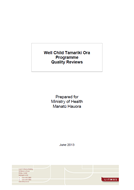
The Well Child / Tamariki Ora programme (WCTO) provides a universal health assessment, health promotion and support service for children and families/whānau from birth to five years. The WCTO programme is also an important gateway to targeted and specialist health, education and social services for children and families/whānau with additional needs.
Following a comprehensive evaluation in 2007/2008, the content, timing and flexibility of core and additional WCTO contacts were changed.
In 2012, the Ministry of Health commissioned a review of how well these changes were adopted and what impact they were having on child health outcomes.
The review was prioritised into the following three areas.
- The content and implementation of the four-to-six week checks of mothers and babies
- The three new WCTO assessment tools: PEDS, Lift the Lip and the WHO Growth Charts
- The content and implementation of the B4 School Check.
1. Four-to-six week checks
Families are eligible for routine checks from their Lead Maternity Carer (at discharge from primary maternity care), their Well Child Tamariki Ora (WCTO) provider (the first of the core contacts) and their general practice team (at the immunisation visit) between four-to-six weeks postnatal. All three checks are included in the WCTO National Schedule.
What the review found
- Parents and providers felt that the purpose of the three separate WCTO checks at four to six weeks needed to be made clearer.
- Providers felt that there was a lack of clarity about the roles of the health professionals responsible for completing the checks.
- There was evidence and provider and parent support for WCTO providing the current services at four to six weeks.
- Information sharing, access and quality could be improved at a service delivery level
2. The three assessment tools
As a result of a 2007/08 review of the WCTO programme, three new evidence-based assessment tools were introduced to improve the health outcomes of New Zealand children. These were:
- Parental Evaluation of Developmental Status (PEDS): at every core contact, from three months, to help identify any developmental or behavioural concerns
- Lift the Lip (LTL) oral health assessment: at every core contact from 9–12 months to check for early signs of tooth decay and promote good oral health practices to parents
- World Health Organization (WHO) growth charts: updated at every core contact, for recording length, height, weight and head circumference.
What the review found
- There was support for using the three tools in WCTO.
- There were quality issues around how providers deliver the tools.
- The tools needed to be better integrated into the WCTO programme, in a way that is consistent with the tool protocols and guidelines.
- Further research is required to assess whether use of the tools will lead to improved outcomes.
3. The B4 School Check
The B4 School Check (B4SC) is the eighth and final core WCTO contact. The B4SC programme was rolled out nationally in 2008 to provide a universal, comprehensive and free screening and health education opportunity for all four-year-old children and their families.
A key focus of the review was to consider the effectiveness of B4SC for high-deprivation populations and Māori and Pacific populations.
What the review found
- There was a strong rationale for the timing and content of the B4SC.
- There was limited evidence for the efficacy of B4SC components for vulnerable populations, in particular, Māori, Pacific and high-deprivation families and whānau.
- There was variable coverage and referral rates across locations, providers and ethnic groups.
- Improvements could be made to the content, delivery, accessibility and cultural appropriateness of the B4SC.
The findings and recommendations presented in the report reflect the status of the WCTO programme at the time of the reviews (2012). Many of the issues identified in the report have already been addressed by WCTO and B4SC providers, district health boards and the Ministry of Health through policies such as newborn enrolment, B4SC performance monitoring and the development of the WCTO Quality Improvement Framework and Quality Indicators in 2013. Recommendations are also being addressed through initiatives such as WCTO Quality Improvement Programmes, shared information system projects and the Children’s Action Plan.
This report is being published as background to recent national and local WCTO Quality Improvement Programmes underway in every district health board or region, and to inform WCTO stakeholders regarding areas for further improvement.
